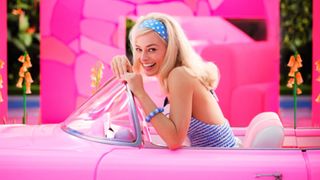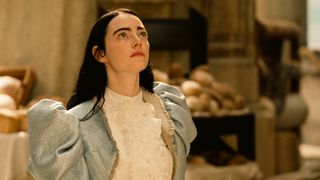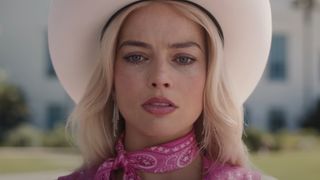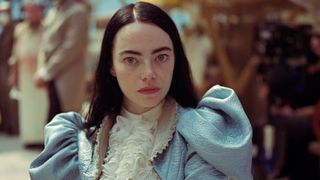Poor Things and Barbie are both surreal, feminine odysseys – and it makes them a surprisingly perfect double bill
Opinion | Barbie and Bella Baxter have a lot in common

What do a sentient plastic doll and a woman with the brain of a baby have in common? Well, as it turns out, quite a lot. Barbie and Poor Things make for a surprisingly resonant double bill, thanks to their strange, surreal exploration of feminine self-discovery.
When we first meet Barbie and Bella, both of them are, in their own way, constrained in roles that have been set for them by another. Barbie lives the same perfect, pink day every day – until those irrepressible thoughts of death begin to creep in. Bella, meanwhile, is an experiment overseen by the keen eyes of scientists Godwin and Max, which means her every move is monitored and recorded; she's also not allowed into the wide world, though that doesn't stop her running to the roof to look beyond her home.
My questing self

Where Bella and Barbie differ, though, is how enthusiastic they are to begin their respective odysseys. When Weird Barbie tells Stereotypical Barbie that she has to choose between the high-heeled pink shoe or the Birkenstock, Barbie quickly chooses the pink. But Bella is aggressively desperate to get outside, challenging Godwin and Max on a carriage ride and screaming in frustration when they block her attempts to make it through the door, until Godwin forcibly renders her unconscious.
Still, Bella and Barbie's journeys run on parallel tracks: eventually, Bella finds a way to be free of Godwin's home, and Barbie decides to leave her pink paradise behind and take the surreal journey from Barbie Land to the real world to uncover the cause of her flat feet and morbid thoughts. And, while Bella's sexual awakening helps spur her journey of self-discovery, Barbie's first brush with sexuality is uncomfortable, with an "undertone of violence."
Plus, both women are accompanied by a man who seeks to exert some kind of control over them: for Barbie it's Ken, for Bella it's Duncan Wedderbern (coincidentally, both Ken and Duncan are played by beloved actors giving all-timers of comedic performances).
At the start of their respective adventures, then, Bella is constantly striving for something new, while Barbie just wants the familiar back, uncomfortable by the new facets of herself she is already discovering – but, in time, she'll come to share Bella's desire for a fully realized life.
Not pretty anymore

As part of their journeys, both women have their illusions shattered. In the real world, Barbie is horrified to learn that little girls don't actually view her as a feminist hero, and that women don't fill the boardroom at Mattel. But Barbie also finds wonder in sitting at a bus stop and watching the mundane intricacies of everyday life; she sheds a single tear after seeing the very ordinary memories of Gloria and her daughter.
Sign up to the GamesRadar+ Newsletter
Weekly digests, tales from the communities you love, and more
Similarly, Bella finds wonder in everything she discovers in the wide world, especially in sex, but is horrified when a new friend of hers shows her a poverty-stricken community in dire straits. Later, after becoming a sex worker, her belief that the women should be allowed to choose who they sleep with is rebuffed by the madam Swiney, who informs Bella to her horror that some men prefer unwilling partners.
Bella is eventually plunged into depression at the brothel, just as Barbie is when she returns to her home to find it infected by the patriarchy. But, both Bella and Barbie find wisdom on the other side of the darkness, as Swiney promised Bella she would – Barbie is distraught when she realizes she no longer fits in her box, but, after saving Barbie Land, she is given the chance to become a real person. Barbie's journey has finally led her to the realization that she wants to experience everything in life, flat feet, Birkenstocks, and all; what Bella wanted from the very beginning.
And as for Bella – who, on her journey, has already experienced many of the soaring highs and crushing lows of what life has to offer – she faces a final patriarchal obstacle of her own before the credits roll. On the cusp of marrying Max, Bella is interrupted by Alfie Blessington, the husband of Victoria Blessington – the woman whose body Bella is inhabiting. Alfie, in a more graphic and disturbing demonstration of the patriarchy than Ken's antics, intends to mutilate Bella and take away her newfound sexual liberation. Fortunately, Bella is able to overcome him, and while Ken gets his redemption, Alfie is given the brain of a goat and kept as a pet, a suitable punishment for his hideous plan.
We must experience everything

"In some ways it would be a relief to be rid of my questing self," Bella says when confronted by Alfie, a sentiment Barbie definitely shares at the beginning of her film. But it's through the full indulgence of their questing selves that Bella and Barbie can experience their own versions of womanhood and come to learn what it is to be human.
It's these sister journeys that make Barbie and Poor Things such a compelling double bill, encouraging us to discover our own questing selves – there's one in all of us, after all.
You can keep up to date with 2024's biggest films with our movie release dates guide.

I'm an Entertainment Writer here at GamesRadar+, covering all things film and TV for the site's Total Film and SFX sections. I previously worked on the Disney magazines team at Immediate Media, and also wrote on the CBeebies, MEGA!, and Star Wars Galaxy titles after graduating with a BA in English.
Most Popular


